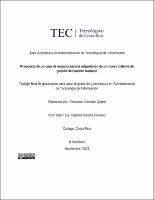Mostrar el registro sencillo del ítem
Propuesta de un caso de negocio para la adquisición de un nuevo sistema de gestión del talento humano
| dc.contributor.advisor | Umaña-Centeno, Gabriel | es |
| dc.contributor.author | Corrales-Quirós, Fernando | |
| dc.date.accessioned | 2022-03-04T17:08:56Z | |
| dc.date.available | 2022-03-04T17:08:56Z | |
| dc.date.issued | 2021-11 | |
| dc.identifier.uri | https://hdl.handle.net/2238/13528 | |
| dc.description | Proyecto de Graduación (Licenciatura en Administración de Tecnología de Información) Instituto Tecnológico de Costa Rica, Área Académica de Administración de Tecnologías de Información, 2021 | es |
| dc.description.abstract | La presente investigación tiene como propósito el desarrollo de una propuesta de caso de negocio para el Departamento de Gestión de Talento Humano del Tecnológico de Costa Rica (TEC). Se pretende crear un documento de apoyo que ayude en la toma de decisiones para una adquisición de un sistema para la gestión de los procesos de negocio. Para llevar a cabo la investigación, se utilizó una metodología cualitativa. Se incluyen entrevistas, revisión documental y anotaciones obtenidas de reuniones con el equipo de trabajo y las personas colaboradoras encargadas de los procesos por estudiar. El caso de negocio sigue la guía establecida por el Val IT para su desarrollo e incluye la hoja de datos, análisis de alineación, análisis de beneficios financieros y no financieros y análisis de riesgos; los pasos finales no se incluyen dentro del alcance. El proyecto consta de cuatro fases que permiten llevar a cabo el análisis de resultados y la propuesta de solución. En la primera etapa, se examinaron los procesos involucrados en el sistema junto con sus encargados con el propósito de determinar la situación actual y el contexto de cada uno. Además, se muestran los diagramas con las tareas o actividades que siguen. La fase dos se llevó a cabo junto con la fase uno por medio de entrevistas. Su finalidad era conocer las necesidades tecnológicas del departamento para establecer los criterios de aceptación que debe seguir la nueva herramienta. La representación de los resultados se hizo por medio de una recopilación y validación de requerimientos funcionales y no funcionales. Con los resultados en las primeras etapas, se elaboró el caso de negocio y, posteriormente, se ejecutó la fase tres que muestra los beneficios recibidos por la implementación del sistema, además incluye un análisis de impacto y tiene en cuenta aspectos operativos. Finalmente, en la fase cuatro se evaluaron los criterios y se determinó si el proyecto era rentable. | es |
| dc.description.abstract | The purpose of this research is to develop a business case proposal for the Human Talent Management Department of the Costa Rica Institute of Technology (TEC, for its acronym in Spanish). The aim is to create a support document that will help in the decision-making process for the acquisition of a system for the management of business processes. A qualitative methodology was used to conduct the research. It includes interviews, document review, and annotations obtained from meetings with the work team and collaborators in charge of the processes to be studied. The business case follows the guidelines established by Val IT for its development and includes the datasheet, alignment analysis, financial and non-financial benefit analysis, and risk analysis—the final steps are not included within the scope. The project consists of four phases that allow the analysis of results and the proposed solution. In the first phase, the processes involved in the system were examined together with their managers to determine the current situation and the context of each one. The diagrams with the followed tasks or activities are also shown. Phase two was conducted in conjunction with phase one through interviews. Its purpose is to know the department technological needs to establish the acceptance criteria to be followed by the new tool. The presentation of results is done through a collection and validation of functional and nonfunctional requirements. With the results obtained in the first stages, the business case is elaborated, and then phase three is executed, which shows the benefits received from the implementation of the system and includes an impact analysis, considering operational aspects. Finally, in phase four, the criteria are evaluated, and it is determined whether the project is profitable. | es |
| dc.language.iso | spa | es |
| dc.publisher | Instituto Tecnológico de Costa Rica | es |
| dc.rights | acceso abierto | es |
| dc.rights.uri | http://creativecommons.org/licenses/by-nc-nd/4.0/ | * |
| dc.subject | Sistemas -- Gestión | es |
| dc.subject | Talento humano | es |
| dc.subject | Negocios | es |
| dc.subject | Tecnología de la información | es |
| dc.subject | Optimización | es |
| dc.subject | Rentabilidad | es |
| dc.subject | Gestión de proyectos | es |
| dc.subject | Systems -- Management | es |
| dc.subject | Human talent | es |
| dc.subject | Businesses | es |
| dc.subject | Information technology | es |
| dc.subject | Optimization | es |
| dc.subject | Cost effectiveness | es |
| dc.subject | Projects management | es |
| dc.subject | Research Subject Categories::SOCIAL SCIENCES::Business and economics | es |
| dc.title | Propuesta de un caso de negocio para la adquisición de un nuevo sistema de gestión del talento humano | es |
| dc.type | proyecto fin de carrera | es |



